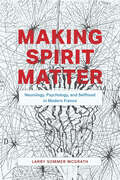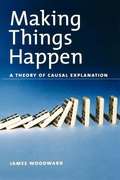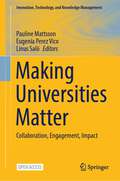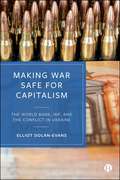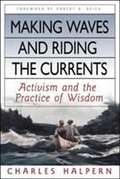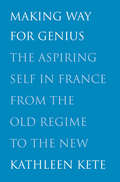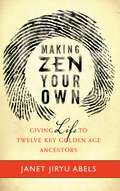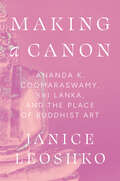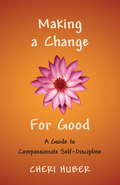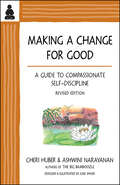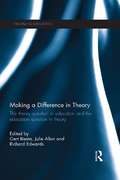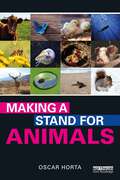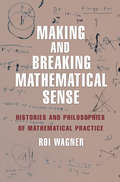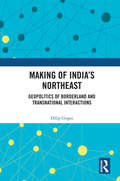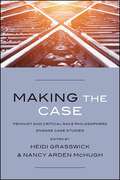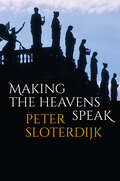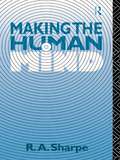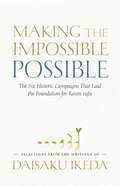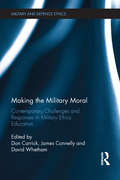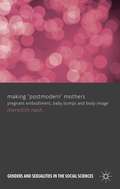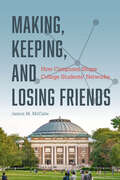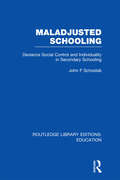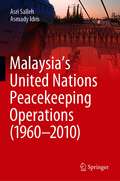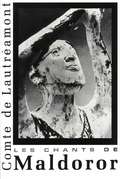- Table View
- List View
Making Spirit Matter: Neurology, Psychology, and Selfhood in Modern France
by Larry Sommer McGrathThe connection between mind and brain has been one of the most persistent problems in modern Western thought; even recent advances in neuroscience haven’t been able to explain it satisfactorily. Historian Larry Sommer McGrath’s Making Spirit Matter studies how a particularly productive and influential group of nineteenth- and early twentieth-century French thinkers attempted to solve this puzzle by showing the mutual dependence of spirit and matter. The scientific revolution taking place at this point in history across disciplines, from biology to psychology and neurology, located our mental powers in the brain and offered a radical reformulation of the meaning of society, spirit, and the self. Tracing connections among thinkers such as Henri Bergson, Alfred Fouillée, Jean-Marie Guyau, and others, McGrath plots alternative intellectual movements that revived themes of creativity, time, and experience by applying the very sciences that seemed to undermine metaphysics and religion. Making Spirit Matter lays out the long legacy of this moment in the history of ideas and how it might renew our understanding of the relationship between mind and brain today.
Making Things Happen: A Theory Of Causal Explanation
by James WoodwardWoodward's long awaited book is an attempt to construct a comprehensive account of causation explanation that applies to a wide variety of causal and explanatory claims in different areas of science and everyday life. The book engages some of the relevant literature from other disciplines, as Woodward weaves together examples, counterexamples, criticisms, defenses, objections, and replies into a convincing defense of the core of his theory, which is that we can analyze causation by appeal to the notion of manipulation.
Making Universities Matter: Collaboration, Engagement, Impact (Innovation, Technology, and Knowledge Management)
by Linus Salö Pauline Mattsson Eugenia Perez VicoIn an era of rapid change and increasing societal demands, the role of universities as knowledge producers and catalysts for change has come under scrutiny. This open access book offers a fresh perspective on the significance of universities in society, shedding light on how their knowledge can truly matter beyond academia. Drawing upon insightful inquiries from both the Swedish and international contexts, this volume delves into the multifaceted interactions between universities and various knowledge users, emphasizing the need for scholars to reflect on how their knowledge can become useful and applicable to wider society. Organized into three compelling themes, collaboration, engagement, and impact, this book explores the concept of "mattering". Together and jointly, they point at the fluid movement of scholars and scholarly knowledge across academic, political, and public spaces, and the intentional actions of scientists to leverage their expertise for real-world impact. Essential reading for social science and humanities scholars, university management professionals, and individuals keen on a critical understanding of the evolving role of universities, this volume offers a comprehensive examination of how universities have mattered, continue to matter, and can shape the future.
Making War Safe for Capitalism: The World Bank, IMF, and the Conflict in Ukraine
by Elliot Dolan-EvansThis book examines the impact of World Bank and International Monetary Fund (IMF) economic restructuring programmes during active conflicts. Using a critical political economy perspective, the book explores how these restructuring efforts affect vulnerable communities’ survival amid violence. Chapters provide a detailed case study of Ukraine during the War in Donbas, analysing the controversial reforms in agriculture, gas and pension sectors. The resulting analysis offers valuable insights into how these reforms have influenced Ukraine’s political economy and the survival of conflict-affected populations since the 2022 Russian invasion.
Making Waves
by Kurt WeylandThis study investigates the three main waves of political regime contention in Europe and Latin America. Surprisingly, protest against authoritarian rule spread across countries more quickly in the nineteenth century, yet achieved greater success in bringing democracy in the twentieth. To explain these divergent trends, the book draws on cognitive-psychological insights about the inferential heuristics that people commonly apply; these shortcuts shape learning from foreign precedents such as an autocrat's overthrow elsewhere. But these shortcuts had different force, depending on the political-organizational context. In the inchoate societies of the nineteenth century, common people were easily swayed by these heuristics: Jumping to the conclusion that they could replicate such a foreign precedent in their own countries, they precipitously challenged powerful rulers, yet often at inopportune moments -- and with low success. By the twentieth century, however, political organizations had formed. Their leaders had better capacities for information processing, were less strongly affected by cognitive shortcuts, and therefore waited for propitious opportunities before initiating contention. As organizational ties loosened the bounds of rationality, contentious waves came to spread less rapidly, but with greater success.
Making Waves and Riding the Currents: Activism and the Practice of Wisdom
by Charles HalpernThis memoir is about working for a compassionate and sustainable world. This teaches how to integrate the inner and outer work of one's lives through the practice of wisdom.
Making Way for Genius
by Kathleen KeteExamining the lives and works of three iconic personalities —Germaine de Staël, Stendhal, and Georges Cuvier—Kathleen Kete creates a groundbreaking cultural history of ambition in post-Revolutionary France. While in the old regime the traditionalist view of ambition prevailed—that is, ambition as morally wrong unless subsumed into a corporate whole—the new regime was marked by a rising tide of competitive individualism. Greater opportunities for personal advancement, however, were shadowed by lingering doubts about the moral value of ambition. Kete identifies three strategies used to overcome the ethical “burden” of ambition: romantic genius (Staël), secular vocation (Stendhal), and post-mythic destiny (Cuvier). In each case, success would seem to be driven by forces outside one’s control. She concludes by examining the still relevant (and still unresolved) conundrum of the relationship of individual desires to community needs, which she identifies as a defining characteristic of the modern world.
Making Zen Your Own
by Janet Jiryu AbelsIn this book, Janet Jiryu Abels traces the life stories of twelve Chinese Zen masters who, together, shaped what was to become known as Zen's Golden Age. She presents their biographies, describes their teachings, and shows how their lives and teachings can inspire those who practice Zen today. The book is a presentation of ancient Zen insight vividly relevant for the twenty-first century, addressing both the needs of both new and longtime Zen practitioners. Its singular distinction is in bringing Zen history, ancestral teachings, and present-day application of those teachings into one work. Although the book is based on scholarly sources and historical records, Abels stresses the humanity of these Zen ancestors, showing that they were not formed from a generic mold but were individuals with quirks, senses of humor, heartfelt enlightenment experiences, varied ways of living, and unique ways of expressing Zen. She tells their stories in a lively, accessible manner, shedding light on their paradoxical teachings with clarity and simplicity. She also shows that they all faced the same challenges that Zen practitioners face today. Interwoven among the stories and teachings are Abels' own insights into the dharma of Zen, as well as practical applications and encouragements that readers can bring to their individual practice of the Way. These insights are based on her more than ten years as a Zen teacher. She is the founder and co-resident teacher of Still Mind Zendo in New York City.
Making a Canon: Ananda K. Coomaraswamy, Sri Lanka, and the Place of Buddhist Art (Buddhism and Modernity)
by Janice LeoshkoThe story of how one scholar’s experiences in Sri Lanka shaped the contours of the Buddhist visual canon. An early interpreter of Buddhist art to the West, Ananda Kentish Coomaraswamy laid the foundation of what would become the South Asian visual canon, particularly through his efforts to understand how Buddhist art emerged and developed. In Making a Canon, Janice Leoshko examines how Coomaraswamy’s experience as the director of a mineralogical survey in Sri Lanka shaped his understanding of South Asian art and religion. Along the way, she reveals how Coomaraswamy’s distinctive repetition of Sri Lankan visual images in his work influenced the direction of South Asia’s canon formation and left a lasting impression on our understanding of Buddhist art.
Making a Change for Good: A Guide to Compassionate Self-Discipline
by Cheri HuberAccording to Zen teacher Cheri Huber, we are conditioned to think that if we were only a little better in some way, we would be happy: "Life isn't the way it should be and it's my fault!" But, Huber says, no amount of self-punishment will ever make us happy or bring us control over life's problems. The help we are looking for is really found in self-acceptance and kindness toward ourselves. By simply allowing ourselves to be guided by our innate intelligence and generosity, which are our authentic nature, we are able to be compassionately present to what's happening now. Compassionate self-discipline--the will to take positive steps in life--is found through nothing other than being present. When we are present and aware, we are not engaged in distracting, addictive behaviors. If we simply cultivate our ability to pay attention and focus on what is here in this moment, our experience can be authentic, awake, honest, and joyful.The book includes a guided thirty-day program of daily meditation, contemplation, and journaling.For more information on the author, Cheri Huber, visit her website at www.cherihuber.com.
Making a Change for Good: A Guide to Compassionate Self-Discipline, Revised Edition
by Cheri Huber Ashwini NarayananMaking a Change for Good will assist anyone to make a change of any kind, whatever the area— diet, fitness, stress, addictions, unskillful behaviors, anxiety, finances, spiritual practice... . Kind, compassionate encouragement for confronting personal issues head on and supportive tools for addressing the struggle are the differences in approach this book offers. Readers realize that lack clarity is the hindrance to addressing an issue, not lack of self-discipline. Rather than being caught in self-hating and self-blaming loops that veer us off course, we can learn to mentor ourselves, and this book teaches us how. The 30-day retreat at the end of the book provides a structure for practicing compassionate self-discipline.
Making a Difference in Theory: The Theory Question In Education And The Education Question In Theory (Theorizing Education Series)
by Julie Allan Richard Edwards Gert BiestaMaking a Difference in Theory brings together original work from an international group of authors on the roles of theory in educational research and practice. The book discusses the different roles theory plays, can play and should play, both from a historical perspective and in light of contemporary discussions and developments. <P><P> Particular attention is paid to the question of whether there are or should be distinctively educational forms of theory and theorising. The double engagement with the theory question in education and the education question in theory and theorising provides original insights in what theory does, might do or should do in educational research and practice. <P><P> With contributions from internationally renowned authors in the field of educational theory, research and practice, the book will be of value to academics, researchers and postgraduate students in education.
Making a Stand for Animals
by Oscar HortaEngaging and thought-provoking, this book examines how humans see and treat other animals and argues that we should extend equal consideration and respect to all beings, human and nonhuman alike. Our world is plighted by ‘isms’ such as racism and sexism, but we may have overlooked a very important one: speciesism. Speciesism is a form of discrimination against those who don’t belong to a certain species. It drives us to see nonhuman animals as objects, rather than individuals with their own interests and with the ability to feel and suffer. This book questions all of the assumptions speciesism is based upon. It raises many challenging questions over humans' very complicated attitudes toward other animals. Thinking about how animals are used as well as the suffering of wild animals, and what the future may be for all beings, this book calls for society to seriously take into account the interests of all animals. For all who care about animals, or simply how to make the world a better place, this book is essential reading.
Making and Breaking Mathematical Sense: Histories and Philosophies of Mathematical Practice
by Roi WagnerIn line with the emerging field of philosophy of mathematical practice, this book pushes the philosophy of mathematics away from questions about the reality and truth of mathematical entities and statements and toward a focus on what mathematicians actually do—and how that evolves and changes over time. How do new mathematical entities come to be? What internal, natural, cognitive, and social constraints shape mathematical cultures? How do mathematical signs form and reform their meanings? How can we model the cognitive processes at play in mathematical evolution? And how does mathematics tie together ideas, reality, and applications?Roi Wagner uniquely combines philosophical, historical, and cognitive studies to paint a fully rounded image of mathematics not as an absolute ideal but as a human endeavor that takes shape in specific social and institutional contexts. The book builds on ancient, medieval, and modern case studies to confront philosophical reconstructions and cutting-edge cognitive theories. It focuses on the contingent semiotic and interpretive dimensions of mathematical practice, rather than on mathematics’ claim to universal or fundamental truths, in order to explore not only what mathematics is, but also what it could be. Along the way, Wagner challenges conventional views that mathematical signs represent fixed, ideal entities; that mathematical cognition is a rigid transfer of inferences between formal domains; and that mathematics’ exceptional consensus is due to the subject’s underlying reality.The result is a revisionist account of mathematical philosophy that will interest mathematicians, philosophers, and historians of science alike.
Making of India's Northeast: Geopolitics of Borderland and Transnational Interactions
by Dilip GogoiThis book examines India’s Northeast borderland – strategically positioned at the confluence of South Asia, East and Southeast Asia – from the perspective of international relations. The volume interrogates the geopolitics of region-making in both colonial and postcolonial times and traces the transformation of Northeast India from a British strategic frontier into a securitised borderland. It situates the region in transnational interactions both in conflict and cooperation with its immediate neighbouring regions of China, Bangladesh, and Myanmar, especially in the context of India’s Look East/Act East policy. The volume paves the way for a new ‘region-state’ framework borne out of the constructivist worldview and offers answers to many conundrums centring border studies. It further delineates approaches to overcoming the present geopolitical and territorial challenges of India’s Northeast with a critical thrust on regional policymaking. The volume will be of interest to students and researchers in the disciplines of social sciences and humanities in India as well as South and Southeast Asia. It will be especially useful to those in politics and international relations, strategic studies, international political economy, foreign policy, development studies and regional development, besides foreign policy-makers and diplomats, development practitioners, economists and policy analysts.
Making the Case: Feminist and Critical Race Philosophers Engage Case Studies
by Nancy Arden McHugh Heidi GrasswickMaking the Case brings together established and emerging philosophers who use case studies to address a variety of contemporary social justice causes. The contributors show both the depth and breadth of work in this area and highlight the distinctive approaches that feminist and critical race theorists, in particular, have pursued. For these theorists, the choice of the kinds of cases analyzed matters, not only pushing philosophy as a field to foreground the challenges facing marginalized groups but also affecting the kind of philosophy that results. This ensures that their theories do not reproduce the conceptual frameworks of dominant groups. By using thickly described cases, as opposed to the thinly described or hypothetical situations that have been the historic mainstay of philosophy, the contributors strive to create philosophy that never strays too far from the complexities of people's lives on the ground. The book provides philosophers with a host of methodologies, theories, and practical examples for use in social justice case work, with topics ranging from census design and gender bias in science to incarceration and the spate of recent police killings of black men and women.
Making the Heavens Speak: Religion as Poetry
by Peter SloterdijkThe idea of a connection between poetry and religion is as old as civilization. Homer consulted the Olympian gods on the fate of the fighters on the plain before Troy, and the poet made the heavenly ones speak. It was through poetry that the gods were brought within reach of human hearing. In the centuries after Homer, the Athenian stage became the setting where gods made their poetic interventions, resolving human impasses and contributing to the emotional synchronization of the public life of the city. Sloterdijk argues that, as with the culture of the Ancient Greeks, all religions inscribe a kind of “theopoetry” at the heart of their cultural life and thought, even as they strenuously obscure these poetic origins through the cultivation and enforcement of orthodox norms. Sloterdijk also shows how, in conditions of religious pluralism, religions poetically reshape themselves to accommodate the demands of the religious marketplace. This highly original study of the poetic devices that inform accounts of the otherworldly offers a new interpretation of religious practice and its theological elaboration through history, as well as a fresh perspective on our contemporary age in which collective life, interwoven with imaginative fabrications, is fraying under critical stress.
Making the Human Mind
by R. A. Sharpe"Making the Human Mind" is an attack on the widespread assumption that the mind has parts and that it is the interaction between these parts which accounts for some of the most characteristic human behaviour, the sorts of irrational behaviour displayed in self-deception and weakness of will. The implications of this attack are considerable: Professor Sharpe contests a realism about the mind, the belief that there is an inventory which an all-seeing deity could compile and which could contain answers to all the questions we could ask about people. With this goes a hermeneutic approach to the understanding of human behaviour: these forms of understanding are markedly different from that suggested by the scientific model and favoured by those who partition the mind. Finally, the author undermines eliminative materialism and the idea that the way we talk about the mind constitutes a "folk psychology", arguing that what is distinctively human about the human mind has been created by self-consciousness and is self-created.
Making the Impossible Possible: The Six Historic Campaigns That Laid the Foundation for Kosen-rufu
by Daisaku IkedaFew believed it could happen. Most dismissed it as fantasy. But when Josei Toda in 1951 revealed his grand vision to grow the Soka Gakkai in Japan from a membership of a mere three thousand to a membership 750,000 households strong, one young disciple vowed to make it happen. Daisaku Ikeda soon took the lead, and over the course of six years and six major campaigns he blazed the trail for the unprecedented growth of a people's movement for peace. He cared for and inspired each person he met along the way, and soon thousands united with him and his mentor, helping person after person overcome their struggles and find true happiness. These are not only inspiring stories from the past but lay out a formula so that we, in our present and future, can turn our impossibilities into possibilities.
Making the Military Moral: Contemporary Challenges and Responses in Military Ethics Education (Military and Defence Ethics)
by Don Carrick, James Connelly and David WhethamThis book offers a critical analysis, both theoretical and practical, of ethics education in the military. In the twenty-first century, it has become increasingly important to ensure that the armed forces of Western and other democracies fight justly and behave ethically. The ‘good soldier’ has to be not only professionally skilled but morally intelligent. At a time of relentless media scrutiny, the publicising of incidents of morally and legally unacceptable behaviour, such as the gross mistreatment of prisoners and the torture of suspected terrorists, can do much to undermine the credibility of those who claim to hold the moral high ground in any particular conflict. Written by an international team of academic theorists and military practitioners, this volume provides inter-disciplinary insights into the present state, and the future, of ethics education in the militaries of Western democracies. The contributors critically address the central question of whether such education is sufficient to prepare members of the armed forces to face the peculiar challenges of conflict environments that are now primarily ‘wars among the people’, in which the opposing combatants may have little or no regard for human life and fail to discriminate between soldiers and civilians when choosing their targets. Drawing lessons from recent examples of unethical conduct, this original book offers insightful and constructive advice, both theoretical and practical, as to how situations can be improved and on the means that could and should be employed towards this end. This book will be of much interest to students of military studies, ethics and international relations.
Making ‘Postmodern’ Mothers
by Meredith NashBased on interviews with pregnant women, this book provides a multi-disciplinary empirical account of pregnant embodiment and how it relates to wider sociological and feminist discourses about gender, bodies, 'fitness', 'fat', celebrity and motherhood.
Making, Keeping, and Losing Friends: How Campuses Shape College Students' Networks
by Janice M. McCabeDraws attention to the importance of support networks for students as they make, keep, and lose friends throughout college and beyond. We’re all familiar with the sentiment that “college is the best time of your life.” Along with a newfound sense of freedom, students have a unique opportunity to forge lifelong friendships at a point in life when friendship is particularly important. Why is it, then, that so many college students are falling victim to what the US Surgeon General termed an “epidemic of loneliness and isolation”? How do different aspects of college life help or hinder students’ ability to form deep connections? In Making, Keeping, and Losing Friends: How Campuses Shape College Students’ Networks, sociologist Janice M. McCabe shows that the way a college is structured—whether students live in dorms or commute, study abroad or stay close to campus, have plentiful common areas for clubs to meet or not—can either encourage or hinder the making of meaningful friendships. Based on interviews with 95 students on three distinct campuses—a small private college (Dartmouth College), a large public university (University of New Hampshire), and a non-residential community college (Manchester Community College)—McCabe captures a wide range of experiences and discovers how features of the campuses make it easier or harder for students to make and keep friends. She shows how and why, across all three institutions, some students thrive in deep and lasting friendships with their peers. As McCabe’s research reveals, we need to look at the structures of students’ networks, the institutions they attend, and the importance of their identities in these places if we are to truly uncover and address the loneliness epidemic facing today’s young adults.
Maladjusted Schooling (Routledge Library Editions: Education)
by John F SchostakThe problems this book discusses are the same now as they were 25 years ago: unemployment, poor housing, inadequate facilities, poverty, racism, violence. What is the function of a school in such a situation? Although many schools hold reformist ideals, their practice is constrained by organisational demands. School organisation is based upon a coercive theory of social control which is intolerant of expressions of individuality by teachers and pupils. Needs for individuality may be mistaken for deviance, and deviance is at least in part produced by, or exacerbated by, school organisation. The author maintains that schooling is therefore largely maladjusted to the needs of individuals.
Malaysia’s United Nations Peacekeeping Operations (1960–2010)
by Asri Salleh Asmady IdrisSmall and developing states make up the majority of participants in United Nations Peacekeeping Operations (UNPKO), and Malaysia is one of these. The numerous previous studies on Malaysia’s UNPKO are primarily historical narratives which focus on practical, policy-related issues and due process, making no attempt to synchronize the nexus between theory and policy analysis. Nor do they cover the theoretical aspect which can operationalize and address the question of the roles played by Malaysia’s domestic actors (foreign policy executives, legislature, military, media, public opinion) in the respective decision-making processes as well as those of external level, such as international power politics and geopolitical considerations. In other words, they are predominantly a historical narrative of only several Malaysia’s UNPKO.This book fills the critical gap. It deliberates on the respective national and international decision-making processes, especially from the Malaysian point of view, and analyses the theoretical and practical impacts of Malaysia’s UNPKO in understanding international politics. Apart from providing a well-researched account of Malaysia’s UNPKO across the globe for 50 years, i.e. 1960-2010, this book examines the determinants by using qualitative data, particularly key-informant interviews and documentary analysis. Thus, while most studies of Malaysia’s UNPKO single out domestic imperatives as the most vital determinant, this book, on the contrary, comprehensively identifies the prevailing world security order as the most important determinant influencing Malaysia’s UNPKO, followed by the domestic ones.
Maldoror (Les Chants de Maldoror)
by Guy Wernham Conte De LautreamontThis macabre but beautiful work, Les Chants de Maldoror, has achieved a considerable reputation as one of the earliest and most extraordinary examples of Surrealist writing. Maldoror is a long narrative prose poem which celebrates the principle of Evil in an elaborate style and with a passion akin to religions fanaticism. The French poet-critic Georges Hugnet has written of Lautréamont: "He terrifies, stupefies, strikes dumb. He could look squarely at that which others had merely given a passing glance." When first published in 1868-69, Maldoror went almost unnoticed. But in the 1890s the book was rediscovered and hailed as a work of genius by such eminent writers as Huysmans, Léon Block, Maeterlinck, and Rémy de Gourmont. Later still, Lautréamont was to be canonized as one of their principal "ancestors" by the Paris surrealists. This edition, translated by Guy Wernham, includes also a long introduction to a never-written, or now lost, volume of poetry. Thus, except for a few letters, it gives all the surviving literary work of Lautréamont.
